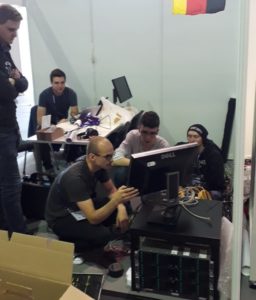 If you’re looking for the big news, the team from CHPC in South Africa won the ISC 2019 Student Cluster competition this year. In this special guest feature, Dan Olds from OrionX shares first-hand coverage of the Student Cluster Competition at last week’s ISC High Performance conference.
If you’re looking for the big news, the team from CHPC in South Africa won the ISC 2019 Student Cluster competition this year. In this special guest feature, Dan Olds from OrionX shares first-hand coverage of the Student Cluster Competition at last week’s ISC High Performance conference.
The lineup of benchmarks and real-world HPC applications for this year’s ISC Student Cluster Competition was a mix of old and new, including some apps that have never been run at a sanctioned international event.
Shirt Scramble & Murderers Row of Benchmarks
Starting promptly at 3:00 pm on Monday, the official starters bell rang, and the students were off in a mad dash across the show floor to find their unique team T-shirts. As each team snagged all of their shirts, they will allowed to start their benchmark runs.
The teams had to complete HPCC (a whole bunch of HPC benchmarks crammed together), HPCG (a stress test for every cluster), and a separate LINPACK run to qualify for the Highest LINPACK award.
Application Tuesday
The students started work on their real-world HPC apps on Tuesday. The ISC cluster competition is a series of sprints, with students getting their applications for the day handed out to them each morning. The organizers do this because they want the students to have some free time to experience both the show and the city of Frankfurt. This also helps narrow the focus of the students to optimizing the applications at hand rather than managing the system for day-long or all-night runs.
 Here’s a brief rundown on the applications:
Here’s a brief rundown on the applications:
- CP2K: This is a quantum chemistry and solid-state physics package that can simulate (at the atom level) a whole heck of a lot of materials. The list includes solid stuff, liquids, crystals, and biological matter, which makes it a pretty handy application to have.
- b Ever wonder how a star is made? Or a moon? Or a black hole? The forces that shape these things are gravity and hydrodynamics, but how do you simulate something so vast and forces so powerful? You get yourself a copy of Swift and a big honking supercomputer to run it on. While you can’t simulate the formation of a star down to the atomic level, Swift helps you describe the process mathematically and calculate out the results – which is a pretty cool thing.
- OpenFOAM: While it’s not the most user-friendly application in the world, OpenFOAM is indispensable when it comes to modeling fluid, gas, or really any other things that flow. Want to figure out how gas flows through a pipe? Or how fluids mix in a manufacturing process? OpenFOAM is the ticket. While OpenFOAM has been run in previous cluster competitions, there’s a twist this year: students are not allowed to use GPUs on OpenFOAM in the 2019 ISC competition – making for a more level playing field and a more difficult optimization problem.
- Mystery Application (PENNANT): Unstructured meshes, which are basically computational meshes containing arbitrary polygons or polyhedral (whatever the hell those are), are common occurrences in many research problems. However, there aren’t many software packages that convert these problems so they can be solved with accelerators like GPUs. PENNANT is a 2,200 line C++ program that uses CUDA to help convert these problems to GPU-friendly form.
- AI Application – Extreme Weather: In this application, the HPC Advisory Council has teamed up with NERSC (National Energy Research Scientific Computing Center) to come up with the workload for this challenge. Students will be provided with a dataset and charged with training a weather model. They will be graded on the accuracy of inferencing unseen data – so it’s not a speed test – the highest accuracy wins.
The ISC19 organizers put together a fiendishly challenging set of applications for the kluster kids this year. There aren’t any lay-ups in this bunch, all will take plenty of thinking and keyboard work to tune and optimize. Stay tuned to see how these plucky undergrads deal with this slate of challenging apps.




